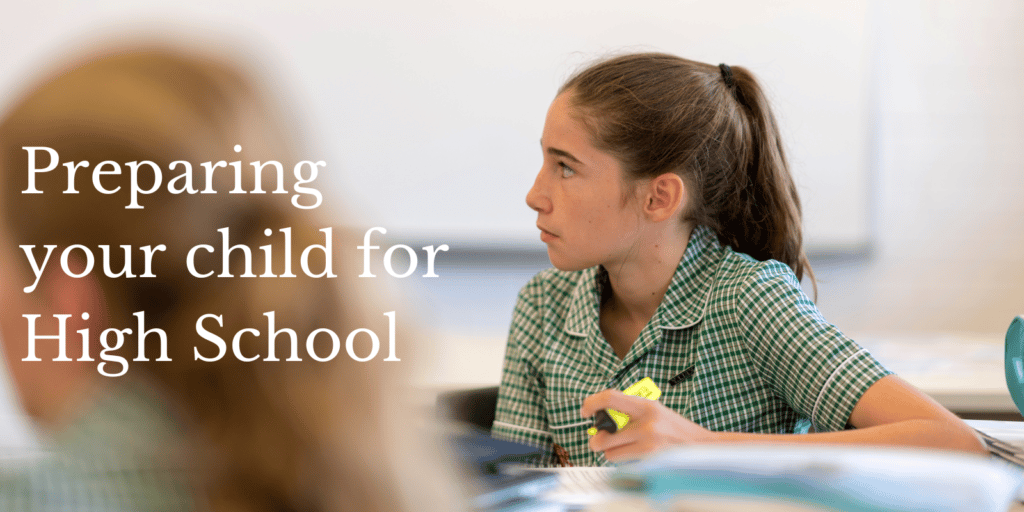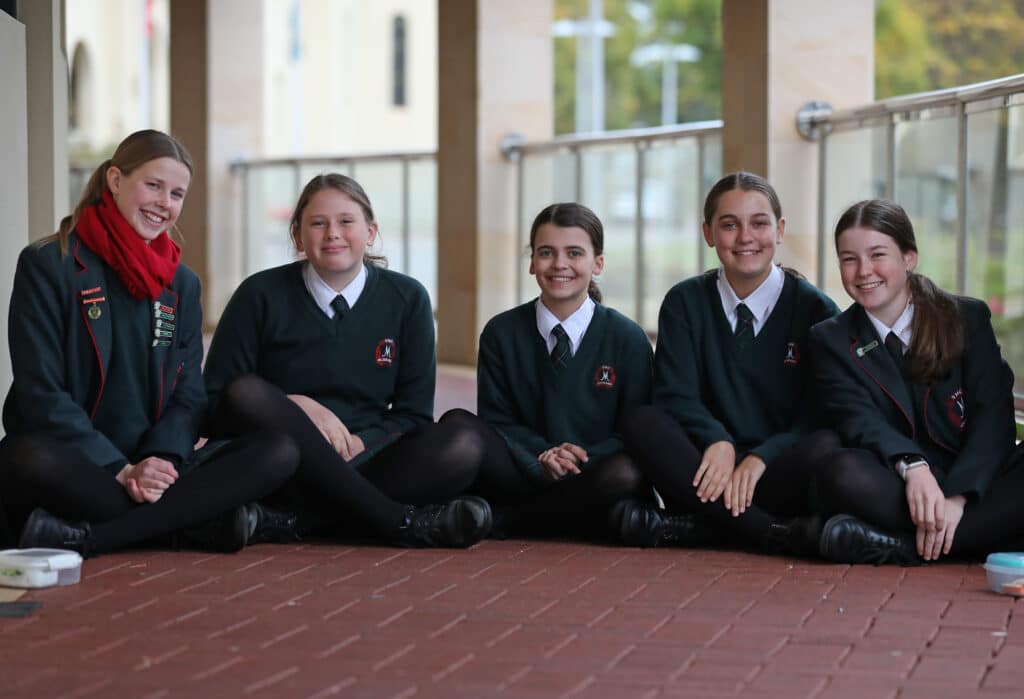Preparing Your Child For High School – Jennifer Oaten

Moving to high school is one of the key milestones of a teenager’s life and a big step up from primary school. Students are faced with new challenges and more responsibility. It can take time to adjust, especially if you come from a small country town or a small primary school. I certainly felt a bit lost when I started high school at Santa Maria College, having come from Margaret River Primary School, a little country school where everyone knew me.
My first few weeks as a Year 8 boarder were a bit of a blur. There were so many new things to take in: the size of the school, the number of students, the different buildings and classrooms, and the new subjects. I was also trying to make new friends while keeping track of what books and materials I needed for each subject. It was all a bit overwhelming!
But slowly and surely, I started to settle in. I made some great friends and learned the ins and outs of high school life. I still had my ups and downs – there were days when I missed my old primary school friends and felt homesick – but overall, I loved high school.
If your child seems unhappy in the first weeks, which may happen, it is important to listen to understand while keeping your own emotions in check. Understanding why they are unhappy and helping them come up with their own solutions is one of the best things you can do. If your response is positive, calm, and reassuring, your child will likely settle in nicely.

The importance of new friends
Making friends takes time but is key for a smooth transition to high school. While Santa Maria College focuses on encouraging connections between students, the following suggestions may also help.
Have a conversation with your child about:
- How friendships often change in high school when there are so many new possibilities for friendship and that time is needed to build new friendships.
- Talking to their old friends. This helps them feel as though they are still socially connected. It is also good for them to have different groups of friends rather than just relying on one best friend.
- How to introduce themselves and start a conversation. Depending on their temperament and social skills, some children may need more support than others. Encourage them to take a risk and say hello. Others may be feeling nervous too.
- Making friends with individuals is easier than with a group, so chatting in class or on the bus is more productive than approaching a large group.
- Asking questions of others and listening to what they have to say, being friendly, interested and making eye contact.
- Exploring new opportunities such as music, sport or other co-curricular activities where they will meet like-minded students.
While making friendships is important, there are many ways parents can assist their daughter in settling into high school.

- Ensuring a good night’s sleep can help children succeed at school and be better able to handle whatever comes their way during the day – both the good and the bad. Transitioning to high school uses a lot of emotional energy, and things always seem much worse when they are tired. Ensure quality sleep by removing all devices from bedrooms, and reading is also strongly encouraged before bedtime.
- Foster a positive attitude in your child. Help them see the good in themselves, others and their school experiences. High school is new and different to Primary school but has some great benefits. Asking ‘what was the best thing they did today’ can focus on the positive rather than the challenges. There will be different emotions excited, nervous, and worried, and all are completely normal.
- Encourage small achievements, be it their first day of finding all classes, going to the café for the first time, packing everything needed for Physical Education (PE), attending their first music lesson, catching the bus or making a new friend. Doing this will reinforce positive behaviours and give them the confidence to continue succeeding and overcoming new challenges. Look for the small wins or positives.
- Allow your child the chance to be independent and to make her own decisions. Be there for support and advice, but don’t try to do everything for them. This will help build strength, courage and resilience in our students. Learning to problem solve for themself is one of the greatest skills a parent can develop in their child.
- Organisation helps students feel more in control. Make sure your child packs their bags and has their uniforms ready, especially sports uniforms, the night before. A student planner is important for keeping track of activities, homework and assessments. Help your child understand how to use it effectively and ensure you are aware of all school communications.
- Promoting good study habits and routines at home helps children transition well. Setting up a quiet, dedicated space for homework is really important. Parents can also set specific times each day or week for focused studying and be open to talking about learning – listening more than talking! Talk about what you did to help you understand and learn information. Knowing how to study is as important as what to study. Ask questions about what they are learning.
- Ensure your child takes on only a few activities in the first term. Make a plan for homework, co-curricular, and sport. Your child must have some downtime during the transition period.
- Avoid giving access to social media. There are many new things to deal with in high school, and the longer you can limit social media use, the better. This adds another layer of complexity which is not needed. At least wait until they are well settled and have firm boundaries around use.
- Plan for unexpected events with your child, such as what to do or say if they:
- Get lost and arrives 10 minutes late for class.
- Arrive at their Maths class and realises they have brought the wrong book.
- Get off the train and realises they have left their sports bag on the train.
- Leave the Science book at school and need it to do their homework.
- Are trying to complete their English homework but are unsure what to do.
- Does not understand what the Maths teacher is saying about how to solve a problem.
- Have sport before school and forgets school shoes.
- Are not sure what to wear for an excursion or the swimming carnival.
- Are still waiting to be picked up, and all the other students have gone.
- Are unwell and have missed school for two days, and are not sure what work to do.
- Accept that there will be good days and bad days. It takes time to transition to high school. Talk to your Homeroom Teacher or Dean if the problem persists. They may have some advice about what has worked for other students in similar situations. You can also talk to other parents who have gone through something similar with their own children.

As your teenager enters high school, they will likely want more independence. Though it can be challenging for parents to see their children grow up and make decisions for themselves, it is important to let them explore who they are and what interests them. However, you will still be an integral part of their experience in high school.
The high school journey is a partnership between the students, parents and staff. The great thing about high school is that it provides great opportunities to explore, grow and flourish in so many different ways.
The future is full of possibilities and excitement once the butterflies settle, new friendships are established, and new opportunities are taken up. Life will become more exciting than ever before.

With Laurissa Knowles From Valley Depths to Mountain Peaks (1993)
Laurissa Knowles (1993) has had an incredible career journey so far, from Santa Maria College Teacher to Celebrant and Councillor.

Elevating Spaces: Diana Ellis’ Signature Touch & Architecture Magic
What happens when you mix a love for art, travel, nature, and creativity with construction and building? You get the essence of Diana Ellis’ career!

The Power of Expectations in Shaping Student Success – Jennifer Oaten
Discover the transformative impact of expectations on student success. Learn how belief shapes outcomes in education and beyond.
- Featured
Author: Santa Maria College
Santa Maria College is a vibrant girls school with a growing local presence and reputation. Our Mission is to educate young Mercy women who act with courage and compassion to enrich our world. Santa Maria College is located in Attadale in Western Australia, 16 km from the Perth CBD. We offer a Catholic education for girls in Years 5 – 12 and have 1300 students, including 152 boarders.






